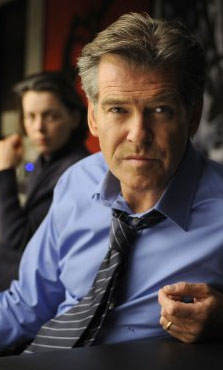 “The Ghost Writer” is a smooth, capable, occasionally witty thriller from Roman Polanski, who knows how to make them better than anyone. Working with Richard Harris to adapt his 2007 novel, Polanski delivers an entertaining, nicely-paced mystery, equal parts modern gothic and Seventies political paranoia. Ewan McGregor is excellent as the unnamed ghost writer who hustles his way into a heap of trouble. Pierce Brosnan and Olivia Williams make for a fascinating pair of political animals; they are captive souls, chilly and crepuscular, yet they bristle with rage at any perceived threat to the public roles in which they’ve imprisoned themselves. “The Ghost Writer” is a smooth, capable, occasionally witty thriller from Roman Polanski, who knows how to make them better than anyone. Working with Richard Harris to adapt his 2007 novel, Polanski delivers an entertaining, nicely-paced mystery, equal parts modern gothic and Seventies political paranoia. Ewan McGregor is excellent as the unnamed ghost writer who hustles his way into a heap of trouble. Pierce Brosnan and Olivia Williams make for a fascinating pair of political animals; they are captive souls, chilly and crepuscular, yet they bristle with rage at any perceived threat to the public roles in which they’ve imprisoned themselves.
The plot is twisty and involving, turning on a series of expert set-piece sequences which show Polanski's still got the touch. Two of the best are the ghost writer following his predecessor’s trail—literally—by using an address programmed into a car navigator and a white-knuckle chase through a ferry boat. The sets and locations are captivating, smartly set on Martha's Vineyard (actually Germany and Denmark, thanks to Polanski's legal tangles) with its mists and the lulling tidal rhythms. The Langs' beach compound, extensively paneled with large windows, is somehow all the more secretive for its superficial transparency; like the Langs themselves, the house's postmodern openness seems a strategy of concealment. Its surroundings seem eerie and inhospitable, at times suspended in a timeless, otherworldly beach-gloom. The local population is sparse but memorably grotesque (Eil Wallach is superb in a cameo). It's a spook story in more than one way: the film's title can refer to two people, the ghost writer hired to complete the book and the ghost of the writer he has replaced. For the first writer haunts the proceedings not only in the lingering questions surrounding his death, but by signs and clues he has left for the living writer to discover, such as a packet of photographs hidden away in a makeshift secret compartment. Polanski has woven political intrigue into a clever, fresh take on the traditional Gothic tale.
To these elements Polanski added a sinister air of self-reflexive theatricality. In any mystery the hero must enter a sinister world to discover its secrets, but “The Ghost Writer” deliberately shines a spotlight on its facades. The shadowy political realm into which the ghost writer steps is pointedly hiding more than its usual store of secrets. For starters there’s the fact that Adam and Ruth Lang have hired the writer to polish an already-completed public monument, not bring the truth to the world; the writer is a tug-boat bringing another captain's ship into port rather than a seeker of facts. Just about every scene involves a performance of some kind, put on for the writer’s benefit (in spirit the film sometimes resembles one of David Mamet's arch long-cons). There are smaller tokens of obvoius deceptiveness, like the fake-colonial theme of the hotel he stays in, or the Asian gardener incongruously raking leaves in a windstorm, seen through a bay window framed by curtains so as to give the impression of a stage or movie screen. (An additional, unflattering instance can be added: Kim Cattrall’s British accent is so atrocious it seems like an intentional play on the phoniness of the entire set-up.) Most obvious of all, Adam and Ruth Lang’s eyes seem permanently narrowed in calculation as they figure out how to uphold the fiction of Adam’s public image. It’s like watching Larry King interview Mr. and Mrs. Macbeth.
The imputation of Lady Macbeth-like powers to Adam's wife is central to why “The Ghost Writer” falters as the political intrigues emerge. Polanski toys with the idea that Ruth, not Adam, was the real power in 10 Downing Street during the buildup to the Iraq War. Of course, since Adam is a thinly disguised Tony Blair, Ruth must be Cherie, and it seems somewhat unlikely that Cherie Blair was a ruthless power-mad harpy, tricked out with bloody daggers and hissing fealty to dark forces (Adam's wife—get it?). For all its success as a mystery, as a roman à clef the film is implausible verging on outlandish. When the writer begins to paw at the edges of the Langs’ secret scandal, and we begin to sense its size and shape, the movie takes a detour into the realm of addle-brained left-wing conspiracy theories. The more we know of the Langs’ past, the closer the film veers toward self-parody. By analogy Tony Blair is made to look foolish—an act of impotent Hollywood revenge not without charm—but he cannot appear any more foolish than those who would take seriously the portentous hints Polanski and Harris keep dropping about "the truth" of Anglo-American power politics. Their murky paranoia stains an otherwise absorbing little thriller.
Originally posted March 2010. |